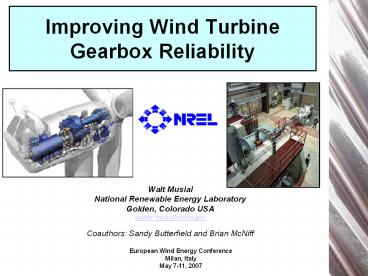European Wind Energy Conference - PowerPoint PPT Presentation
1 / 17
Title:
European Wind Energy Conference
Description:
Title: Introduction to ANSI/AGMA/AWEA 6006-A03, Standard for Design and Specification of Gearboxes for Wind Turbines NREL/DOE Wind Turbine Drivetrain Research – PowerPoint PPT presentation
Number of Views:177
Avg rating:3.0/5.0
Title: European Wind Energy Conference
1
Improving Wind Turbine Gearbox Reliability
- Walt Musial
- National Renewable Energy Laboratory
- Golden, Colorado USA
- walter_musial_at_nrel.gov
- Coauthors Sandy Butterfield and Brian McNiff
2
Observations on the basic problems
- Actual life is below expected design life.
- Problems are generic in nature.
- Poor quality is not the primary cause.
- Most failures initiate in the bearings.
- Problems are more dependent on bearing
configuration than size.
3
Bearing Failure Observations
- General adherence to design standards
- ISO 2812007
- Proprietary codes prevent design transparency.
- Bearing manufacturers are not equipped to solve
the problem on their own. - No single, simple solution is expected.
- Collaborative approach is needed.
- Weaknesses in the design process are suspected.
4
Possible Design Process Weaknesses
- Missing Load Cases
- Irregular or unanticipated bearing responses
- Excessive flexibility of gearbox mount.
- Non-uniform safety applied to gearbox
subcomponents.
5
Typical Wind Turbine Architecture
6
Typical Gearbox Mounting
Hub
Main Low Speed Shaft Bearing
Gearbox
Trunnion Mounts
Mainshaft
Bedplate
7
Trouble Spots
- Planet bearings
- Intermediate shaft-locating bearings
- High-speed locating bearings
3
2
1
8
Test Articles (phase I)
- Test platform between 600-kW and 900-kW.
- 2 gearboxes with identical instrumentation.
- Upgrade both units to state-of-the art.
- Cooling, filtration, gear finish, lubrication,
and bearing types. - Measure External and internal loads and
displacements. - Thermal measurements
- Condition monitoring
- Expert failure analysis and forensics
9
Three Point Approach
10
NREL Dynamometer Specifications
- 2.5 MW power delivery
- Full power regeneration at 480/575/690 or 4160
volts - Torque input range 0 - 1.62 million N-m.
- Speed range from 0 - 2250 RPM
- 500 kN non-torque shaft loads capacity.
- SCADA and automated torque/speed controls
11
Dynamometer Testing
- Measure bearing responses to controlled load
cases. - Increase load complexity and build confidence.
- Develop non-torque load capability and simulate
actual operating conditions. - Establish transfer functions between shaft
loading and bearing responses.
12
Field Testing
- Ponnequin Windfarm in Northern Colorado USA
- Extensive measurements on a single turbine.
- Characterize load events
- Correlate loads with component internal gearbox
responses. - Site-wide failures and statistics.
13
Drivetrain Analysis
- Multi-body dynamic analysis of test article.
- Codes FAST, Simpack, LVR
- Model bearing response under various load
conditions measured in Dyno and Field. - Model drivetrain solutions with tuned model.
14
Summary
- Bearing failures are contributing to fleet-wide
reductions in wind turbine gearbox life. - A comprehensive three-part program to identify
and fix weaknesses in the design process was
initiated at NREL. - A collaborative long-term approach is required
involving all stakeholders.
15
Panel Questions
16
Panel Questions 1
- What is different with the Wind Turbine
application compared to other industries - What efforts (technical) are happening with your
part of the industry to improve reliability
(changes, research, design tools etc) - Is there something in the design process that is
lacking or needs more emphasis (loads
description, rating methods, design tools
17
Panel Questions 2
- Where do uncertainties exist in the loads,
design, rating and system integration? - For prototype validation what should be tested/
validated/ verified to improve confidence in
designs - What future research needs to be done to improve
reliability































